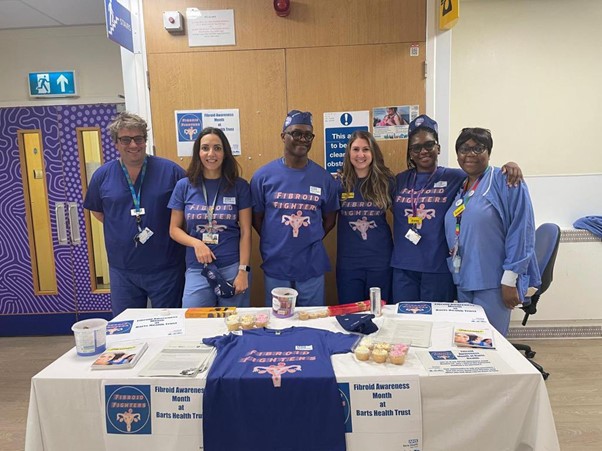Fibroids, the most common non-cancerous growths

Dr Funlayo Odejinmi (3rd from the left) is a consultant gynaecologist, specialising in minimal access surgery at Whipps Cross hospital, discusses raising awareness of fibroids.
What are Fibroids?
Fibroids are the most common non-cancerous growths in the female genital tract, typically located in the uterus. They can affect up to 80% of women during their lifetime, with a higher prevalence among individuals of Afro-Caribbean descent. These growths can lead to various issues, such as heavy menstrual periods, exerting pressure on the bladder and bowels, and even affects on fertility. As a result, they have a significant impact on a woman's quality of life and can impose substantial financial burdens on both individuals and society.
Unfortunately, due to the stigma often associated with menstrual health, women frequently hesitate to seek the care they need. And even when they do reach out for help, their voices and concerns are not always heard or adequately addressed. This lack of understanding and acknowledgment can hinder proper management and treatment of fibroids, further exacerbating the challenges faced by affected women.
Who is normally affected and how are they treated?
Presently, the approach to managing fibroid symptoms revolves around providing individualised care. In the past, numerous myths surrounding fibroid treatment hindered women from seeking the care they required, as there was a prevalent belief that hysterectomy was the predominant treatment option. However, the landscape has changed significantly, and now women have access to a broader range of "womb-preserving" treatments. Both medical and surgical options are available, tailored to meet the specific needs of each patient. This shift in approach ensures that women can make informed decisions about their care, considering the most suitable treatment options that align with their preferences and health requirements.
What are we doing to help patients in this disease area?
At Barts Health, and especially at Whipps Cross, we prioritise our patients' well-being and place them at the heart of fibroid care. Despite being a small unit, we are deeply committed to research and have an impressive track record of over 30 peer-reviewed publications in renowned international journals. Our vast experience has allowed us to care for numerous women dealing with fibroids.
Our vision is to challenge conventional practices and drive advancements in both surgical and medical approaches by introducing innovative methods for managing and treating this condition. To achieve this, we are dedicated to providing all modalities of treatment in one comprehensive location. This enables women to choose the mode of care that aligns with their individual needs and future goals.
In our facility, we offer conservative management options, and we have a fully operational centre for uterine artery embolization on-site for those women who opt for this modality. As the third-largest provider of keyhole surgery for fibroid management in London, Barts Health, predominantly at Whipps Cross, boasts skilled surgeons who can deliver this specialized care to appropriately assessed patients. Our unit's exceptional performance in this area exceeds the national average, making us leaders in the field with the aim of providing a convenient and efficient "one-stop service," we are actively working on integrating a fibroid care centre into our existing women's center. Additionally, we are currently preparing a proposal to introduce robotic surgery for managing gynaecological conditions, extending its application to include women with fibroids. Our dedication to patient-centered care and continuous advancement ensures that we strive to offer the best possible outcomes for women dealing with fibroids.
We have recently liaised with Pharmacy and DTC has just approved the use of a new medication for the treatment of suitable women with fibroids in the North-East London region.
We have this month applied to the 'advancing healthcare' fund of the Barts Charity to pilot a new minimally invasive treatment for fibroids.
I am proud of the reputation our team at Whipps Cross Hospital has cultivated as a specialist fibroid centre, and the strides we continue to take to bring the latest advancements in healthcare to our patients in north-east London. Daniella Soar, Divisional manager, Women's and Children
Any advice for people affected by fibroids?
The most crucial piece of advice I would offer to women experiencing heavy and/or painful periods is to seek assistance from your GP or a specialist provider. If diagnosed with fibroids, it is essential to actively inquire about your condition and explore various treatment options while staying well-informed. Remember, surgery is not the sole solution for all women, so consider seeking second opinions when necessary. Your healthcare providers should be capable of discussing the advantages and disadvantages of each treatment method, taking into account your current and future needs as a woman.
Furthermore, doctors and health professionals should always address your concerns and thoroughly explain the potential complications associated with any recommended course of action. Upon receiving a fibroid diagnosis, I strongly advise women to seek advice promptly to prevent potential future complications. It's essential to be aware that in many cases, fibroids may not even require treatment. Empower yourself with knowledge and make informed decisions about your health and well-being.
Come and chat with us
In light of Fibroid Awareness Month (July), we are hoping to have our final informtion stall on 31 July in the reception area of the maternity building.
Everyone is welcome and can ask questions about fibroid diagnosis etc. There will be cake!
